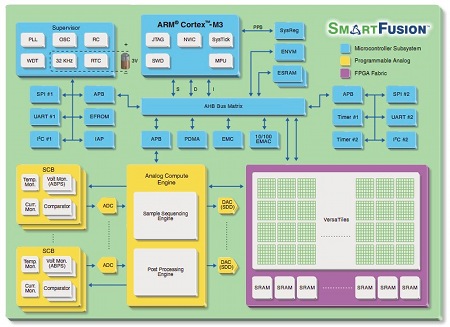FPGAs get tiny Linux, Red Hat-compatible IDE
Aug 23, 2010 — by LinuxDevices Staff — from the LinuxDevices Archive — 9 viewsActel Corporation announced the addition of Red Hat Linux and Windows 7 support to its Libero IDE (integrated design environment) for FPGAs (field programmable gate arrays). The SmartFusion FPGAs are also being treated to a tiny “Unison” Linux, capable of running in as little as 1KB of RAM, the company says.
Actel says version 9.0 of its Libero IDE for FPGA programming adds support for 32- and 64-bit editions of Windows 7 plus 64-bit editions of Windows Vista, and includes Windows USB driver support. Red Hat Linux support has also been added for the first time, the company says.
Other new features in Libero 9.0 are said to include a fabric clock conditioning configurator (Fab_CCC) and programming for the SmartFusion A2F500 device, supporting its secondary PLL/CCC. In addition, there's now programming support for the RTAX4000D four-million gate radiation-tolerant spaceflight DSP device, which adds embedded radiation-tolerant multiply-accumulate blocks to the previous RTAX-S product family, according to the company.

Actel's SmartFusion architecture
(click to enlarge)
Actel claims its SmartFusion intelligent mixed signal FPGAs are the only devices that integrate an FPGA, ARM Cortex-M3 core, and programmable analog, offering full customization, IP protection, and ease-of-use. The devices are "ideal for hardware and embedded designers who need a true system-on-chip (SoC) solution that gives more flexibility than traditional fixed-function microcontrollers, without the excessive cost of soft processor cores on traditional FPGAs," the company says.
The RTAX DSP devices, meanwhile, are said to feature hardened flip-flops for protection against the effects of heavy ion radiation in space. Up to 840 I/Os are offered in hermetically sealed Ceramic Quad Flat Pack, Land Grid Array, or Ceramic Column Grid Array packages, according to Actel.
Actel says the Libero IDE "provides an efficient methodology for creating complete simple and complex embedded processor-based system-on-chip (SoC) designs with ease." Designers can use the SoCs' powerful microprocessor subsystem (MSS) standalone, or create a more complex system by by utilizing available programmable gates in the SmartFusion fabric, the company adds.
Libero IDE features are said to include:
- Powerful project and design flow management
- Full suite of integrated design entry tools and methodologies:
- SmartDesign graphical SoC design creation with automatic abstraction to HDL
- Core Catalog and configuration
- Fabric utilization for SmartFusion designs
- HDL and HDL templates
- User-defined block creation flow for design re-use
- ViewDraw schematic capture
- Actel cell libraries
- Synplify Pro AE synthesis fully optimizes Actel FPGA device performance and area utilization
- Synphony HLS AE performs high-level synthesis optimizations within a Simulink environment
- ModelSim VHDL or Verilog behavioral, post-synthesis and post-layout simulation capability
- Designer physical design implementation, floorplanning, physical constraints, and layout
- Timing-driven and power-driven place-and-route
- SmartTime environment for timing constraint management and analysis
- SmartPower provides comprehensive power analysis for actual and "what if" power scenarios
- Interface to FlashPro programmers
- Post-route probe insertion and Identify AE debugging software for Actel flash designs
- Silicon Explorer debugging software for Actel antifuse designs
A tiny Linux for the SmartFusion devices
In conjunction with Waterloo, Canada-based RoweBots, Actel also announced a tiny Linux that can run on the SmartFusion devices themselves. "Unison" does not require a memory management unit (MMU) and has a small memory footprint, the company says.
According to Actel, Unison offers POSIX and Linux compatibility with hard real-time performance, complete I/O modules, small memory footprint — as little as 1K of RAM and 6K of flash — and an easily understood environment for device driver programming. Seamless integration with FPGA and analog features is fast and easy, and more than thirty demonstration programs are included "that work out of the box in 10 minutes," the company adds.
Wendy Lockhart, senior manager, design solutions marketing and training at Actel, stated, "Our ability to offer a Linux-compliant OS opens the door for a whole new range of SmartFusion designers. These designers now have access not only to a Linux operating system but an OS that has a modular memory so they can further reduce the memory footprint."
Further information
According to Actel, version 4 of Unison is free for commercial use, and downloadable complete with basic features, documentation, a serial I/O package, and a file system. Version 5 may be purchased from RoweBots and provides a fully supported version with an extensive feature set, numerous add on modules, royalty free licenses, source code, extensive documentation, maintenance, consulting support, and the demos mentioned earlier in this story.
More information on Unison may be found on the Actel website, here, or RoweBots website, here. A live webinar providing further information will be held this Wednesday, Aug. 25 at 9:00 a.m. PDT, and may be registered for here, the company adds.
The Libero IDE is free of change in a Gold edition or $2,495 per seat in a Platinum edition, according to Actel. Further information, including the difference between the versions, may be found on the company's website here.
This article was originally published on LinuxDevices.com and has been donated to the open source community by QuinStreet Inc. Please visit LinuxToday.com for up-to-date news and articles about Linux and open source.